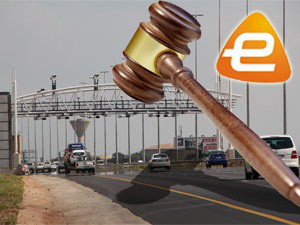
The war of words around government's now live open-road tolling project continues to mount, as the SA National Roads Agency (Sanral) and Justice Project SA (JPSA) dispute the legality governing the system.
In response to criticism over Sanral's warning to untagged motorists to pay up or face serious consequences, the state-owned roads agency says JPSA is desperately trying to reverse e-tolling - "in spite of what the courts have ruled on four occasions".
"JPSA has confused two different legal process: one being the Administrative Adjudication of Road Offences (Aarto) process and the other the prosecution in terms of the Criminal Procedures Act (CPA)."
Sanral maintains the non-payment of e-toll fees is a criminal offence in terms of the Sanral Act, (Section 27(5) of Act 7 of 1998. "Enforcement will be done in terms of the CPA 1977 - and not Aarto, as assumed by [JPSA chair] Howard Dembovsky."
Section 27(5)(a)states: "Any person liable for toll who, at a toll plaza or other place for the payment of toll determined and made known in terms of subsection (1), refuses or fails to pay the amount of toll that is due - (a) is guilty of an offence and punishable on conviction with imprisonment for a period not longer than six months or a fine, or with both the term of imprisonment and the fine."
Although the conviction and nature of punishment will be determined by the courts, says Sanral in a statement, Dembovsy's "continuous assertions that motorists can break the law without any consequences borders on irresponsibility and a despicable attitude towards the rule of law".
Sanral says it will not mislead the public into thinking there will not be consequences. "Also, a criminal conviction does lead to a criminal record. The latter has its own consequences in spite of Dembovsky wishing it were not so."
While the roads agency concedes JPSA is correct in saying Regulation 6(5) of the e-road regulations requires Sanral to issue an invoice to any person from whom it requires payment of outstanding e-tolls, it says "that refers to a person who has already defaulted by not paying within the seven-day grace period."
Regarding JPSA's request for transport minister Dipuo Peters and Sanral to obtain a declaratory order deeming the provisions of the e-tolling laws to be valid in light of the mistakes contained in the e-toll tariff Gazette, Sanral cites retired law expert Professor Marinus Wiechers: "An obvious mistake will not affect the validity of legislation".
If JPSA will not trust Wiechers' opinion, says Sanral, the concerned parties "must approach the courts to obtain the declaratory order it is so excited about"
Counter attack
Dembovsky disputes the notion that he - or JPSA - has made any "...assertions that motorists could break the law without any consequences".
He says has required clarification of procedures and conflicting laws, and "[Sanral] is clearly avoiding the issue that the laws on which e-tolls are based are unclear and contradictory and that the 'mistakes' add to the public confusion".
Instead of the Department of Transport recognising its duty to clarify - and where necessary remedy the erroneous and conflicting laws - says Dembovsky, Sanral "seeks to attack me, the public and bodies acting in the interest of the public".
Meanwhile, the Opposition to Urban Tolling Alliance (Outa) - which, despite losing its legal battle remains intent on opposing government's e-toll system - has scorned Sanral spokesperson Vusi Mona's recent comments directed at e-toll critics.
"It is sad to see how one individual seems to put their critics down and refer to our disrespect as being 'pathetic'. In short, we do disrespect this policy because it is not in the best interests of society and as such, it has and will continue to attract the wrath of the people."
Outa chair Wayne Duvenage says it is a serious problem for businesses that Sanral "expects them to pay amounts of notification without VAT invoices. This is wrong, not only for business but individuals as well".
Share